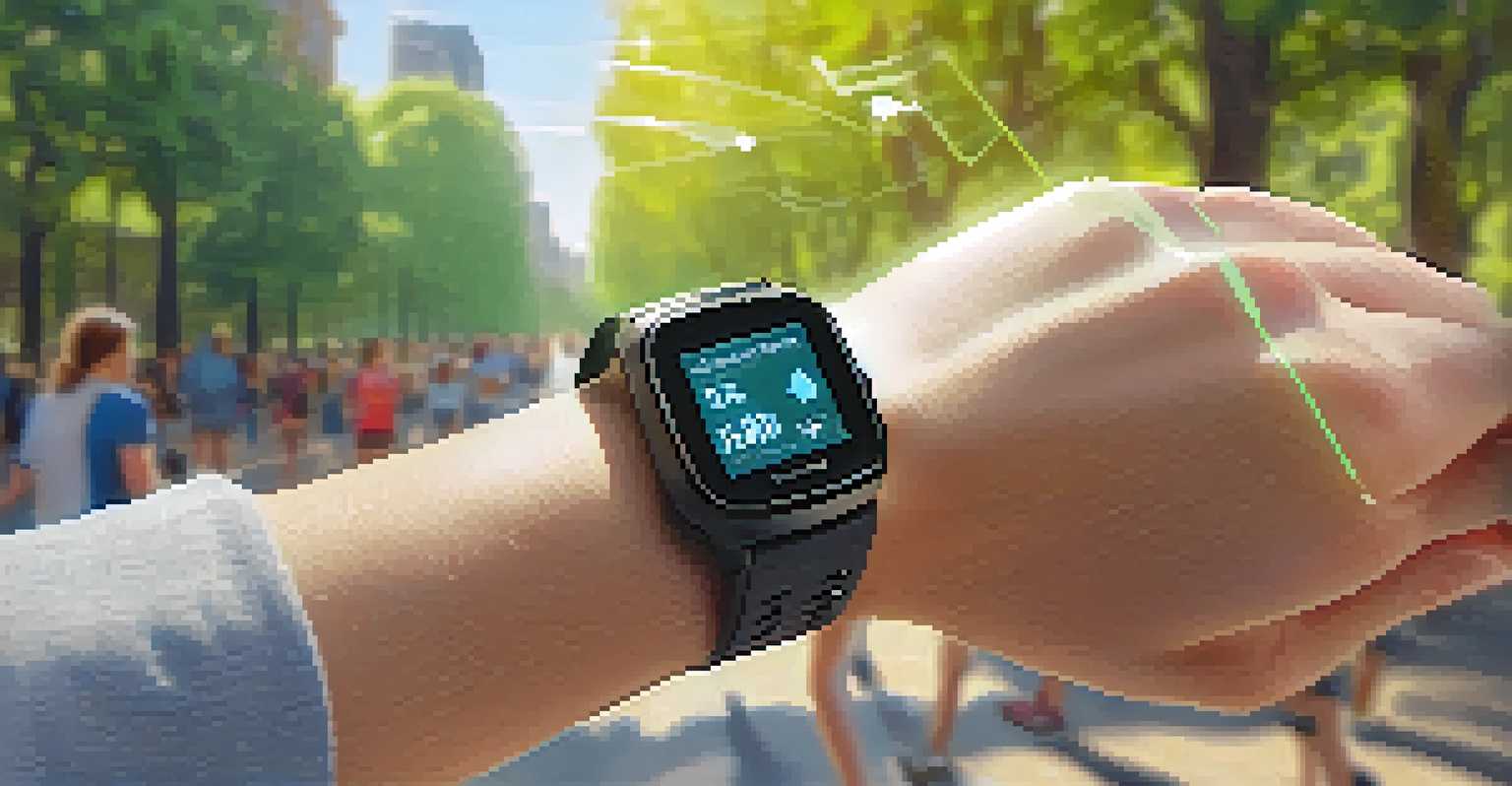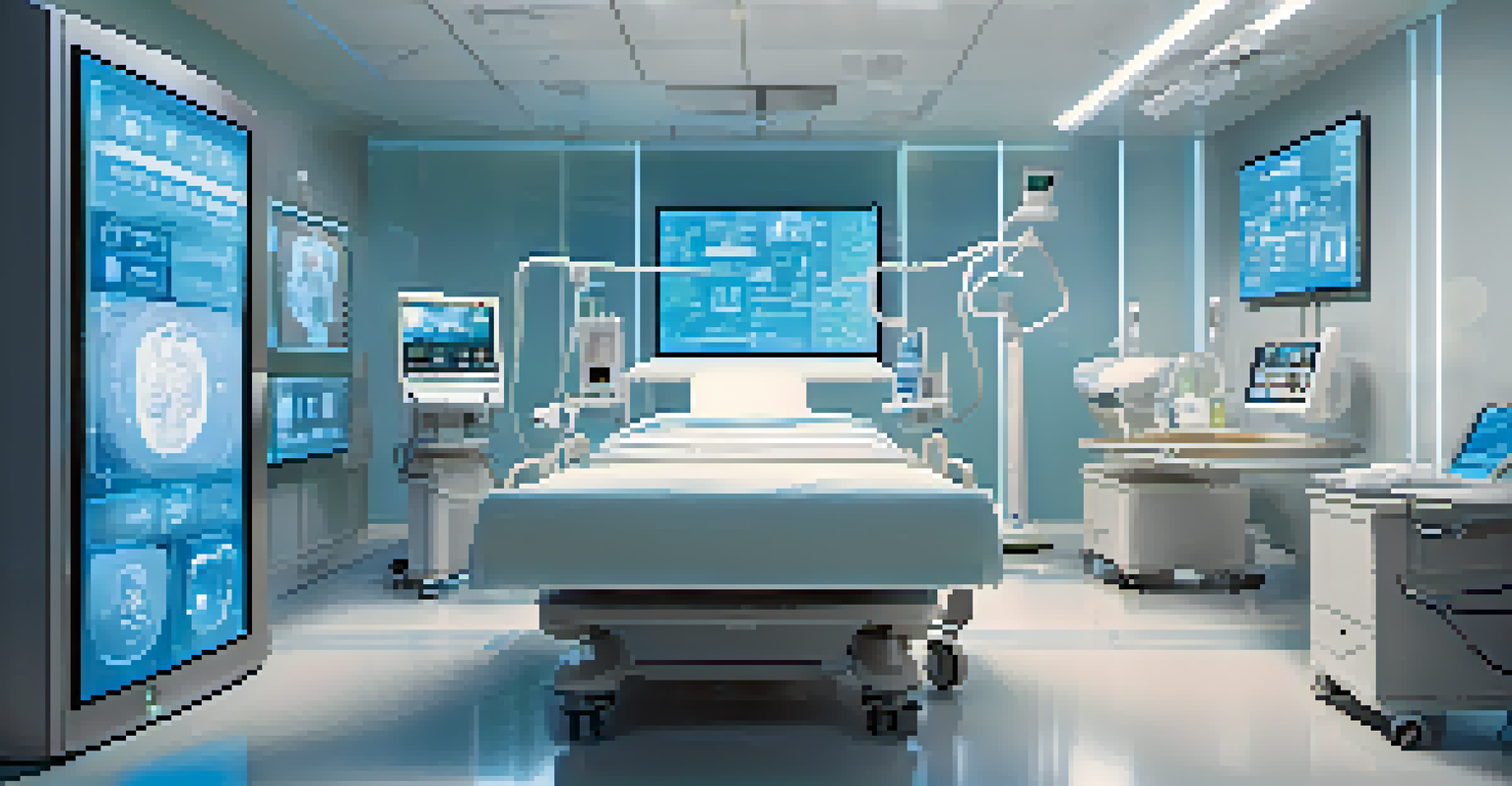Healthcare Technology Trends Shaping the City’s Future

Telemedicine: A Convenient Choice for Urban Patients
Telemedicine has gained significant traction, especially in urban areas where busy lifestyles often hinder access to healthcare. With the click of a button, patients can consult their doctors from the comfort of their homes, making healthcare more accessible. This convenience not only saves time but also reduces the burden on local healthcare facilities, allowing them to focus on more critical cases.
The greatest medicine of all is teaching people how not to need it.
Moreover, telemedicine is particularly beneficial for specialized consultations. Urban residents may struggle to find specialists close to home, but through virtual visits, they can connect with experts from anywhere. This opens the door to a wider range of healthcare options and improved patient outcomes.
However, while telemedicine is on the rise, it's essential to address digital literacy and access to technology. Ensuring that everyone can benefit from these services is crucial for equitable healthcare in the city.
Wearable Health Tech: Monitoring Wellness on the Go
Wearable health technology, like fitness trackers and smartwatches, is revolutionizing personal health management. These devices allow users to monitor their heart rates, activity levels, and even sleep patterns, providing valuable data that can inform healthcare decisions. For urban dwellers, this means a more proactive approach to their health in a fast-paced environment.

Additionally, wearables can alert users to potential health issues before they become serious. For instance, a sudden spike in heart rate detected by a smartwatch could prompt a user to seek medical advice, potentially preventing a more severe health crisis. This real-time feedback empowers individuals to take charge of their health.
Telemedicine Enhances Healthcare Access
Urban patients can easily consult doctors online, reducing the burden on local facilities.
Yet, it's essential to remember that while wearables provide useful insights, they are not a substitute for professional medical advice. Users should view these devices as tools to enhance their health journey, not as definitive diagnoses.
AI and Data Analytics: Transforming Patient Care
Artificial intelligence (AI) and data analytics are becoming integral to modern healthcare, particularly in urban settings where large datasets are available. These technologies can analyze patient histories and predict health trends, enabling doctors to provide personalized care. This shift not only enhances patient outcomes but also streamlines operations within healthcare facilities.
Technology is best when it brings people together.
For example, AI can assist in diagnosing conditions based on symptoms and medical history, significantly reducing the time it takes to arrive at a diagnosis. In cities with diverse populations, this capability is invaluable, as it can adapt to various health needs and cultural backgrounds.
However, the use of AI in healthcare raises ethical questions about data privacy and the potential for bias in algorithms. As cities embrace these technologies, it's crucial to establish guidelines that protect patient information and ensure fair treatment.
Smart Hospitals: The Future of Urban Healthcare Facilities
Smart hospitals are emerging as a key trend in urban healthcare, integrating advanced technologies to enhance patient experiences and operational efficiency. These facilities utilize IoT (Internet of Things) devices to monitor patients in real-time, enabling quicker responses to their needs. Imagine a hospital where your room temperature adjusts automatically based on your comfort level – that’s the future we’re heading towards.
Furthermore, smart hospitals can optimize resource management, ensuring that staff and equipment are used efficiently. This is particularly important in cities where healthcare demand can fluctuate dramatically. By leveraging technology, hospitals can minimize wait times and improve service delivery.
Wearables Promote Health Awareness
Fitness trackers and smartwatches help users monitor their health proactively in fast-paced environments.
Nonetheless, the transition to smart hospitals requires significant investment and training. It’s essential to ensure that staff are equipped to handle these advanced systems to fully realize their potential benefits.
Robotics in Surgery: Precision and Efficiency Combined
Robotic surgery is one of the most exciting advancements in healthcare technology, particularly in urban hospitals where access to specialized care is vital. These systems allow surgeons to perform complex procedures with enhanced precision, resulting in shorter recovery times and less invasive techniques. For patients in bustling cities, this means quicker access to life-saving treatments.
Moreover, robotic systems can assist in training new surgeons by simulating surgical procedures in a risk-free environment. This not only enhances the skill set of new medical professionals but also ensures that patients receive high-quality care during actual surgeries.
However, the high costs associated with robotic surgery systems can create disparities in access. It’s critical for healthcare policymakers to consider how to make these technologies available to a broader range of facilities and patients.
Blockchain in Healthcare: Securing Patient Data
Blockchain technology is making waves in the healthcare sector, especially in urban areas where data security is a growing concern. By providing a decentralized and secure method for storing patient data, blockchain can help reduce the risk of data breaches and ensure patient confidentiality. This is particularly crucial in cities with a high volume of sensitive healthcare information.
In addition to enhancing security, blockchain can streamline the sharing of medical records between providers, improving continuity of care. Imagine a scenario where a patient can seamlessly share their medical history with multiple healthcare providers without the hassle of paperwork – that's the potential of blockchain.
AI Transforms Patient Care Efficiency
Artificial intelligence enables personalized healthcare by analyzing patient data and predicting health trends.
However, the implementation of blockchain in healthcare is still in its infancy. As cities look to adopt this technology, ongoing education and collaboration among stakeholders are essential to navigate challenges and maximize its benefits.
Augmented Reality: Enhancing Medical Training and Care
Augmented reality (AR) is transforming medical training and patient care in innovative ways. In urban medical schools, students can use AR to visualize complex anatomical structures, deepening their understanding and enhancing their skills. This hands-on experience in a controlled environment prepares them for real-world challenges they will face in busy hospitals.
In practice, AR can also assist surgeons during operations by overlaying critical information onto their field of view. This technology can guide them through complex procedures and minimize human error, significantly improving patient outcomes. For urban surgeons dealing with high-stakes situations, this support can be invaluable.

However, like all technologies, AR must be implemented thoughtfully. Training staff to use these tools effectively is essential to ensure that they enhance rather than hinder the healthcare process.